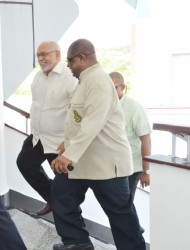Up to US$1,575.000 of the US$5 million to be disbursed on the execution of the Micro and Small Enterprise Development and Building Alternative Livelihoods For Vulnerable Groups Project will be spent on the project’s Collateral Guarantee facility which will essentially provide large numbers of small business owners and potential owners access to financing through the commercial banking sector.
The Small Business Bureau (SBB) the entity created under the Small Business Act of 2004 will guarantee up to 40 per cent of the collateral requirements of the commercial banks up to a maximum of $12 million for loans.

The Collateral Guarantee facility seeks to respond to a long-standing controversy in the local small business community over what persons seeking commercial bank lending have charged are stringent lending conditionalities but which the commercial banking sector insists are safeguards that are consistent with their responsibility to their depositors.
Meanwhile, the Bureau says it will be expending up to US$1,473,500 on providing training for small business holders. Chief Executive Officer Derrick Cummings told Stabroek Business that the Bureau will be seeking “the best possible training facilities” to ensure that business owners secure “high-quality training” to enable them to meet the expectations of the project. The Bureau lists business processes and service efficiency “applicable for the various sectors, low carbon activities and vulnerable groups.”
Meanwhile, Stabroek Business understands that the Bureau will be sinking some US$675,000 into providing subsidies on interest rates on loans. The subsidies, according to the Bureau, will be based on government concessions, Loans will be disbursed at 6% and some sectors will benefit from subsidies of between 3% and 5% which in effect means that some borrowers will access financing at interest rates as low as 1%.
A further US$500,000 has been earmarked for spending under the Grant Scheme component of the project. The project makes provision for an allocation of up to US$1,500 to any single business and may be granted to persons who do not qualify for commercial bank lending because of perceived risks.
The “priority sectors” that are eligible for one or another forms of support from the project include farming, processing, aquaculture, eco-tourism, business process outsourcing and bio-ethanol.
Launched just over a week ago by President Donald Ramotar at the International Conference Centre, Liliendaal, the project targets low carbon activities including energy-efficient transportation, apiculture and internet and computer services for support. Vulnerable groups in mining and forestry which are affected by sectoral restructuring are also eligible for support under the project.




